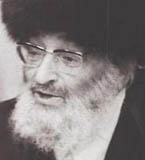
#1064
Awareness of the Almighty
Awareness that the Almighty loves you, cares about your
welfare, and orchestrates events in your life for your ultimate benefit
is a powerful foundation upon which to build your life. Integrating
emunah (awareness of the Almighty) and bitochon (Trust in Him) gives you
a life of joy and serenity.
(From Rabbi Pliskin's book, Serenity, p.91)
#1065
Trust in the Almighty
Trust in the Almighty calms a person from fears and worries. A
person who lives with trust in God is aware there are no accidents. He
knows whatever happens to him is purposeful.
Trust in God does not mean we must assume that "everything will be all
right." We have no way of knowing in advance exactly how events will
turn out. Rather, trust in God means that whatever occurs is for our
ultimate good, and we have the ability to withstand any tests.
Speaking pious sentiments of trust in God is not sufficient. A person
has to actually feel this trust for it to actually effect on his
emotions.
(Alei Shur, p.258; Rabbi Pliskin's Gateway to Happiness, p.166)
19 Kislev

Yahrtzeit
of the Maggid of Mezrech (1710-1772), the successor of the Baal Shem
Tov, who consolidated chassidic teachings into a structured, cohesive
movement. Among the ideas he emphasized was the importance of clinging
to God in all actions -- business, social and religious. The Maggid also
taught of perfecting one's soul in order to bring about the redemption
of the world. Today, tens of thousands of chassidim trace their
spiritual roots back to the Maggid of Mezrech.
20 Kislev

Yahrtzeit
of Rabbi Yitzhak Hutner (1906-1980), the brilliant dean of the Chaim
Berlin yeshiva in New York, whose thousands of students formed the
nucleus of American Jewish leadership in the late 20th century. Rabbi
Hutner had a warm, welcoming posture toward all Jews, and two of his
disciples, Rabbi Shlomo Freifeld and Rabbi Noah Weinberg, founded the
first baal teshuva yeshivas. In 1970, Rabbi Hutner was on an airplane
which was hijacked by Palestinian "Black September" terrorists, and was
held hostage on a runway in Amman, Jordan. (After all the hostages were
removed, the planes were blown up in front of TV cameras.) Rabbi
Hutner's discourses on Shabbat and the holidays, influenced largely by
the Maharal of Prague, are collected in the seven-volume, Pachad Yitzhak. He is buried in Jerusalem.
19 Kislev
In those days there was no king in Israel; each man did that which was proper in his own eyes (Judges 21:25).
While people have common sense which can lead them to do right
and avoid wrong, they also face another obstacle (see yesterday) that
could cause them to stray from the correct path - the drive for
immediate gratification.
How powerful is this force? Imagine a car being driven along a highway,
which is pulled off its course by a powerful magnet. The "magnet"
affecting our behavior is the craving for gratification.
The force of seeking immediate gratification can mislead us. We may
yield to it because its lure blinds our perception of justice. In
reality, we have been bribed, and the Torah accurately states that a bribe will blind the eyes of even the wise (Deuteronomy 16:19). Thus, we only do what is proper when our "eyes" function well.
The Rabbi of Rhizin gave an antidote for the distorting forces of
temptation. He stated that we should go through life the way tightrope
walkers maintain their delicate balance: when they feel a tug on one
side, they lean toward the opposite side. When we feel tempted to
something, our first reaction should be to steer ourselves away from it.
Only then can we apply our common sense and decide what to do.
Summing up, once we recognize and control our desire to impress others
and our drive for immediate gratification, we will be able to exercise
proper judgment.
Today I shall ...
...
try to be on guard against temptations that may affect my sense of propriety and justice.
20 Kislev
Consider
three things, and you will not approach sin. Know whence you came,
whereto you are going, and before Whom you are destined to give an
accounting (Ethics of the Fathers 3:1).
If we thought about our humble origin on the one hand, and the
greatness we can achieve on the other, we would come to only one logical
conclusion: the potential for such greatness could not possibly reside
in the microscopic germ-cell from which we originated. This capacity for
greatness can reside only in the neshamah (soul), the spirit which God instills within man.
What an extraordinary stretching of the imagination it must take to
think that a single cell can develop into the grandeur which a human
being can achieve! People have the power to contemplate and reflect upon
infinity and eternity, concepts which are totally beyond the realm of
the physical world. How could something purely finite even conceive of
infinity?
Our humble origins are the greatest testimony to the presence of a
Divine component within man. Once we realize this truth, we are unlikely
to contaminate ourselves by behavior beneath our dignity. We have an
innate resistance to ruining what we recognize to be precious and
beautiful. We must realize that this is indeed what we are.
Today I shall ...
... try to make my behavior conform to that which I recognize to be the
essence of my being: the spirit that gives me the potential for
greatness.



